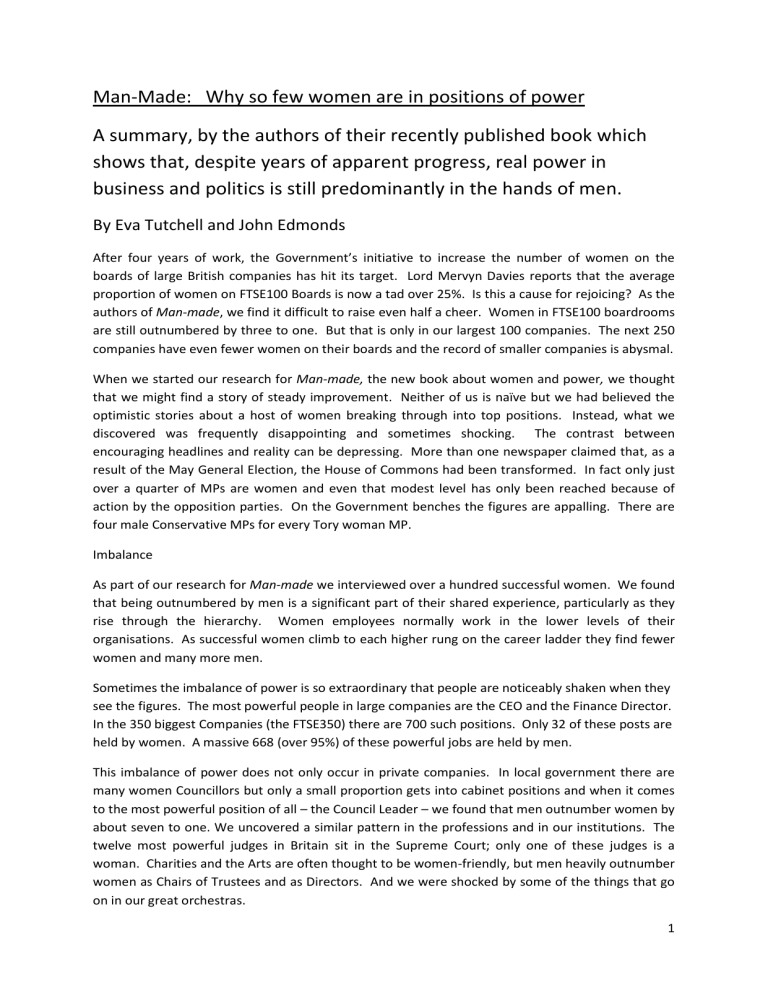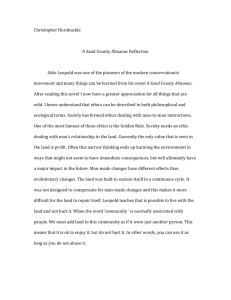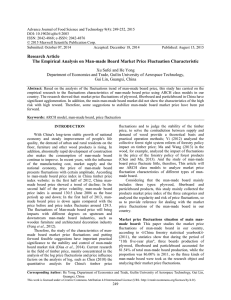Man-Made Summary

Man-Made: Why so few women are in positions of power
A summary, by the authors of their recently published book which shows that, despite years of apparent progress, real power in business and politics is still predominantly in the hands of men.
By Eva Tutchell and John Edmonds
After four years of work, the Government’s initiative to increase the number of women on the boards of large British companies has hit its target. Lord Mervyn Davies reports that the average proportion of women on FTSE100 Boards is now a tad over 25%. Is this a cause for rejoicing? As the authors of Man-made, we find it difficult to raise even half a cheer. Women in FTSE100 boardrooms are still outnumbered by three to one. But that is only in our largest 100 companies. The next 250 companies have even fewer women on their boards and the record of smaller companies is abysmal.
When we started our research for Man-made, the new book about women and power, we thought that we might find a story of steady improvement. Neither of us is naïve but we had believed the optimistic stories about a host of women breaking through into top positions. Instead, what we discovered was frequently disappointing and sometimes shocking. The contrast between encouraging headlines and reality can be depressing. More than one newspaper claimed that, as a result of the May General Election, the House of Commons had been transformed. In fact only just over a quarter of MPs are women and even that modest level has only been reached because of action by the opposition parties. On the Government benches the figures are appalling. There are four male Conservative MPs for every Tory woman MP.
Imbalance
As part of our research for Man-made we interviewed over a hundred successful women. We found that being outnumbered by men is a significant part of their shared experience, particularly as they rise through the hierarchy. Women employees normally work in the lower levels of their organisations. As successful women climb to each higher rung on the career ladder they find fewer women and many more men.
Sometimes the imbalance of power is so extraordinary that people are noticeably shaken when they see the figures. The most powerful people in large companies are the CEO and the Finance Director.
In the 350 biggest Companies (the FTSE350) there are 700 such positions. Only 32 of these posts are held by women. A massive 668 (over 95%) of these powerful jobs are held by men.
This imbalance of power does not only occur in private companies. In local government there are many women Councillors but only a small proportion gets into cabinet positions and when it comes to the most powerful position of all – the Council Leader – we found that men outnumber women by about seven to one. We uncovered a similar pattern in the professions and in our institutions. The twelve most powerful judges in Britain sit in the Supreme Court; only one of these judges is a woman. Charities and the Arts are often thought to be women-friendly, but men heavily outnumber women as Chairs of Trustees and as Directors. And we were shocked by some of the things that go on in our great orchestras.
1
We struggled to find any sectors where women have a dominant position. The one exception seems to be in primary education where women occupy about 71% of the headships. But move into secondary education and men are once more in control, as they are in further education and in the universities.
Taking British society as a whole, we found that, on average, men hold about four out of five positions of power and that women hold the remaining 20%. The picture is so stark that MP Angela
Eagle has coined a graphic phrase to describe the situation. Britain, she says, is “an 80:20 society”.
Is it getting any better? If so, the progress is glacially slow. We interviewed Brenda Hale, that solitary woman on the Supreme Court, and she was not encouraging. “I am disappointed that in the ten years since I was appointed not one among the thirteen subsequent appointments has been a woman.”
In a better world, this unfairness would be universally recognised and the need for remedial action would be self-evident. However, when we explain the conclusions from our research at conferences and seminars, it is clear that a number of men (and a few women) do not regard increasing gender equality as a high priority. They ask whether it really matters if men hold almost all the senior positions and very few women get to the top. So, in Man-Made, we spell out the reasons why reform is so urgently necessary.
The Business Case
The Prime Minister says that he wants more women to reach positions of power. A politician might have been expected to focus on the imbalance of power within the political parties and within government. However David Cameron chose instead to call for changes in the governance of private companies. His rationale is that there are major economic advantages in having more women in the boardrooms of Britain and the Prime Minister is a keen advocate for what is called the “Business
Case” for change.
Much of the so-called Business Case is compelling. Choosing the top people from the whole of the population rather than just from the half which is male, immediately doubles the talent pool. Having both men and women in boardrooms means that decisions are likely to be better scrutinised than if only the life experience of men is brought to the table. Recent research also suggests that companies with both women and men at the top are less liable to take big risks compared to those with all-male boards. There is even a suggestion, so far unproven, that companies with women on the board have a better profit record.
However the problem with the Business Case is not with what it claims to deliver but in respect of what it ignores. Supporters of the Business case never seem to talk about unfairness and rarely mention equality. The case for having more women at the top is based on the claim that they will make companies perform better and not on the more obvious argument that everyone in Britain – whether they are female or male – should have an equal opportunity to get to the top. Somewhere in the policy discussion, the enthusiasts for the Business Case seem to have forgotten that the achievement of equality should be the driving force for reform.
That complaint is often brushed aside. There are many people in senior positions in Britain who, after a rather peremptory expression of regret, will explain that the problem in our society is not
2
that women are treated unequally but that women do not to take advantage of the opportunities that are available to them. “They are less ambitious than men; they do not apply for the jobs; they don’t want to work the long hours; they have other priorities; they want to give more time to their families.” There is a lengthy catalogue of overlapping arguments, many listed in self-help books, suggesting that women have only themselves to blame. If only they tried harder or were more ambitious or were more willing to promote themselves, all would be fine.
The unhelpful legacy
In Man-Made we examine whether it is the women who need fixing or whether the problem lies in the system and that we should aim to fix that. We start by noting what is frequently overlooked.
Our system of government, our professions, our companies, our institutions and almost every aspect of British society have been fashioned by men for the convenience of men. In a case study we tell the story of one of our biggest companies, Shell UK. Founded by a man, managed almost exclusively by men and, as its former Chairman told us, Shell UK forms a congenial network in which men can flourish. Some women have recently got close to the top and there are women non-Executive directors but the Management Board, where so much of the power resides, is exclusively male. In this company, as in most organisations, women have to fit into a system and into a culture that they had no part in creating.
Most organisations are structured to suit men – careful distinctions of status between layers of hierarchy with governing bodies that are large and formal. At the top, long attendance hours with little time for family, an ethos that the job must take precedence over every other obligation and a blinkered attitude of mind where any request for flexibility is regarded as showing a lack of commitment. There is now much research evidence to demonstrate that such structures do not work very well: talent is underused and the concentration of power at the top stifles initiative.
Plenty of women have also told us that they are uncomfortable in organisations with narrow and inflexible command and control structures. Nevertheless, to be successful, women have to find a way to fit in. And most of the interviewees told us that, because - as women - they are regarded as outsiders, they were under a constant pressure to prove themselves, and that usually means working harder than the men.
This legacy comes mostly from the nineteenth century when women had no vote, few legal rights, no property and no power. That all seems a long time ago but Man-made is full of examples of how the customs and attitudes of that distant past maintain a grip on our lives. The House of Commons is laid out like a gentleman’s club. Our great institutions are determinedly male. The Institution of
Civil Engineers has had 151 Presidents: 150 men and just one solitary woman. Sometimes the results are bizarre. University teachers are called Fellows even when they are women and their female students study for degrees that make them into Bachelors or Masters.
But the legacy has an even deeper significance. We are taught from the cradle that men are the doers and the leaders and that the role of women is to help and support. Anyone who doubts that truism should try to buy a birthday card that shows a girl who is active and in control. Indeed the conditioning is so strong that many men find it difficult to envisage a woman in a leadership position.
We lost track of the times we were told about high-profile women who had been mistaken for junior staff and were patronised accordingly.
3
Women in our culture are expected to be nice, helpful and obliging. Leaders on the other hand are expected to be tough, decisive and dominant, like an army general – an old fashioned and inappropriate image but one that is still embedded in our national consciousness. We were told about one particular woman who was thought not to have leadership qualities because she
“consulted too much”. Certainly that was never a criticism that could have been levelled at the autocratic Fred Goodwin during his disastrous time as Chief Executive of RBS.
This conflict between what is expected of a “normal” woman and what is expected of a leader creates a Catch 22 problem for ambitious women. If a woman appears helpful and supportive she may well be liked and valued but she will not be regarded as a candidate for promotion. On the other hand if she starts behaving like an archetypal male leader, she may climb the career ladder but she will almost certainly be intensely disliked. Tough and decisive men are admired; tough and decisive women are liable to be labelled as hard and unfeminine.
Looking the part
Because Man-Made is written by both a women and a man, we can contribute very different experiences. A man knows, in a way that a woman cannot, exactly how men speak about women in all-male company. When no women are present, the tone is often sexist and the jokes are often insulting. From time to time the guard drops and a tennis male commentator disparages the appearance of a Wimbledon women’s champion or the emails of a well-known man are hacked and he is found to refer to women as “gash” or by some other obscenity. But such events are quickly dismissed as aberrations. Regrettably they are not. One of the saddest features of our society is that men feel able to comment, often in intimate detail, about how women look and about whether or not they are desirable.
Although most of this offensive examination takes place in private, every woman knows that not only is she expected to behave in a particular way, but she must also be very careful about her appearance. The pressure starts early and persists throughout a woman’s life. Little girls are told how important it is to be pretty. Teenagers are surrounded by adverts that promote a particular and, for most girls, an unattainable body shape. Women of all ages are bombarded with advice on their make-up, hairstyle and, of course, on the desperate need to be slim. In Man-Made we quote research that shows the extent of body shame and how damaging it is to women’s self- esteem.
Men and women are judged very differently. Men are allowed to go grey without comment but when Mary Beard, the well-known academic, appeared on television with long grey hair, the social media was filled with criticism and abuse.
Almost every woman we interviewed talked about the importance of appearance and the burden it imposes. Our interviewees suspect that many men still judge women more by how they look than by their ability. Indeed some successful women told us that men do not start listening to what a woman says until they have sized her up and decided whether she is attractive or not. There are traps everywhere. An ambitious woman must never appear sexy or she will be the subject of gossip but she must never appear drab because she will be pitied or, worse still, ridiculed. So she has to find the right way to look and, without many role models to emulate, this is easier said than done.
At the very least, as one woman put it, searching for the right style takes up an awful lot of brain space.
4
Surprises
The interviews produced many surprises, some unwelcome. We were alarmed by the sexual harassment that some of the women had suffered. A number of the incidents were truly appalling.
Most were mentioned, usually with great reluctance, at the end of the interview almost as an afterthought. But it was clear from how the incidents were recalled that they had a deep effect on each woman who had suffered.
More prevalent were the stories of the relentless low level sexism still encountered by many of the women we listened to. It was memorably described by one woman as “like water torture”.
Discrimination takes many forms. The gender pay gap is well known but we were surprised to find that the official figure produced by the Office of National Statistics (ONS) is based on a comparison that significantly understates the extent and importance of gender pay differences. The ONS figure is about 10%. A more representative figure is double that.
We also found plenty of examples of promotion denied or of opportunities constrained. One woman in banking said that she and her female colleagues would often get on the short list for a top executive position but rarely got the job. Sometimes women seem to be ushered away from the most powerful posts or were denied leadership of the most prestigious projects. After that happens a few times the temptation is to move on and we found that many organisation suffer a substantial loss of talented women. It is not yet as bad as in the US, where the attrition of middle ranking women is so great that it has been called a national crisis, but the problem does seem to be increasing.
The baby question
The moment when most women discover the full extent of the unfairness in our current system is when they have their first child. One woman reminded us that “the baby question” has never been resolved. The normal career is expected to be unbroken with no space for maternity leave. Some women told us that the best time to have children is before a career takes off; others said that it is best to wait until a career is established. The truth is that there is no right time. Whenever a woman is absent, men are being promoted and leaving her behind.
Childbirth brings many problems. Mothers are paid less and promoted less. Childcare can be a nightmare. Many women noticed that, once they had children, they were no longer regarded as reliable employees. Some said the best way to avoid unfair treatment is not to mention their children - in effect to make them “invisible”. The most devastating comment came from women who had chosen not to have children: they said that the decision to be childless had helped their careers. One of the great failures of our society is that our power structures and our systems of work do not take proper account of the self-evident fact that women become pregnant and bear children.
5
Enforcement
What should we do about this complex of problems? Man-Made is not just concerned with describing the source, interaction and severity of the injustice in our society; our aim is to find remedies and solutions. People talk about the smashing the “glass ceiling” but TUC General
Secretary Frances O’Grady sees things differently. She says, “Never mind the ceiling, the whole house needs to be rebuilt from the skirting boards to the roof.” We are convinced that because so many of the attitudes, customs and practices that we have identified are long-standing and deeprooted, only a thorough-going process of reform will be successful. Quick-fix solutions do not work.
So the last part of Man-made is about how we can achieve equality, not in the 70 or 100 years that are predicted if we let current policies run their course, but in a single generation. We set out a programme consisting of ten specific reforms.
Our programme is extensive and not all the policies can be explained here but the starting point for our process of reform is easy to identify. The important laws of the 1970s – the Sex Discrimination
Act and the Equal Pay Act – were intended to deal with the two greatest injustices suffered by women. They were important in declaring public policy and changing some management practices but unfortunately they have not delivered the fair treatment that they promised. The reason is simple: the laws have never been properly enforced.
A woman who feels that she has suffered discrimination must to take her case to a Tribunal. At first sight that seems wonderfully reasonable. In practice it usually results in a horrendous experience for the applicant. Tribunals were meant to provide informal justice in a relaxed atmosphere but that hope has never been fulfilled. To be successful, the woman applicant has to challenge her employer in public and that can be traumatic. The employer’s lawyers will most likely disagree with her version of events, cross-question her about the details and suggest that she is either mistaken or telling lies. Human Rights Barrister Helena Kennedy always warns women about the risks of taking discrimination cases. “You may be a victim of your success even if you win the case… You may well be seen as a trouble maker by future employers. It might well be a pyrrhic victory.”
We believe that it is ludicrous to rely on the bravery of individual women to enforce major social legislation. The task of enforcing the law should be transferred to a public agency.
Transparency
Man-Made reveals that much unfairness and discrimination in Britain’s workplaces tends to be hidden, the result of informal practices that are neither exposed nor explained. Organisations are expected to treat men and women equally but it is very difficult to discover how their policies work in practice. Companies often boast about their commitment to equality of opportunity but they rarely publish the information which would allow their claims to be tested. We argue that companies and other organisations should be required by law to be open and transparent about gender pay differences and about the positions and status of men and women in their employ. Reports should be regular, up-to-date, and published in the name of the Chief Executive.
Positive action
The British Government believes that voluntary action will increase the number of women in senior positions and has ruled out changes in legislation. Unfortunately for the supporters of voluntarism it
6
is very difficult to find an example anywhere in the world where the voluntary approach has worked.
Indeed more and more progressive Governments now accept that government intervention is necessary and desirable. Norway has led the way by introducing a quota system that requires the boards of large companies to include at least 40% women (and 40% men). The rest of the world is following. The British Government’s opposition to quotas is looking more and more like an outdated and minority position.
Whenever quotas or other forms of direct government action are contemplated, the objection is usually made that senior positions must be filled on merit and that taking positive action to increase the number of women conflicts with the merit principle. So, in Man-made, we have examined the merit argument very carefully.
At first sight it is difficult to believe that men are better equipped than women to make good decisions. We know that girls tend to outperform boys at primary and secondary school and we know that more women than men gain university degrees. But it was when we went on to examine exactly how senior positions are actually filled that the injustice of the present system was exposed.
Are top jobs filled on merit? The answer is: not nearly as often as it is claimed. Almost all senior appointments in the private sector are made informally and without due process. Only 1% of positions on boards of FTSE100 companies are advertised. Some vacancies are filled from lists produced by Head-hunters but rather more are filled from friends and personal contacts. This means that most women (and many men) do not even know a vacancy exists until after it has been filled.
Career breaks
Our final recommendation is the most radical. After commenting with approval on measures to make work patterns more flexible and showing how structures and careers can be made more comfortable for women, we conclude that a more fundamental change is necessary if equality is to be achieved. In particular we need to disrupt the notion that the normal career path is linear and unbroken. We need to make breaks in work – that are so necessary to women and for which they are so heavily penalised - into a normal feature of everyone’s working life.
Fortunately there will soon be an opportunity to make that change, bringing relief to women and - we are glad to say - better career prospects for men.
Girls born today will probably live to 100 and boys will not be far behind. So we face a working life not of 40 years but of 60 years and perhaps even longer. This explosion in longevity means that the world of work has to change; few people can contemplate 60 years of continuous graft without feeling tired and demoralised. That gives us a unique opportunity to make working lives more fulfilling and more equal.
We will need a new system of work as we respond to the challenge of increasing life expectancy.
The fourth theme of our programme is the proposal that paid career breaks should be a key element in that new system.
Career breaks can easily be justified in economic terms. As working lives grow ever longer, properly managed breaks will be necessary to allow for retraining, for a second chance at higher education,
7
for periods of rest and reflection and for the opportunity to change direction and move into a new career. Men will like all that. And by including childbirth and childrearing in the career break system, women will have more flexibility to plan their families without damaging their prospects at work.
Our big idea will make the world of work fairer for women and more congenial for men. Careers will become more varied with fresh starts and new opportunities. And women will no longer find that after childbirth they are always playing catch-up.
Political Pressure
Will any Government elected in the next few years have the determination and foresight to adopt our radical programme? Only, we conclude, if female activists put politicians under the sort of sustained pressure that we last saw 40 years ago. And here is a dilemma. Women want equality but we found that many, including younger women, dislike being called feminists. The myths of braburning and man-hating still make women hesitate. So, at the end of Man-made, we speculate about whether the new generation of women campaigners can rehabilitate feminism and mobilise the power to change the out-dated culture of Britain.
Success will bring many rewards and not just to women. But if we allow Governments to take no effective action, we had better apologise to our granddaughters and to our great granddaughters because those women and girls will pay the price of our failure.
August 2015
8






